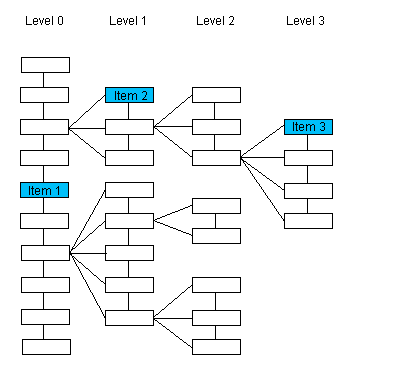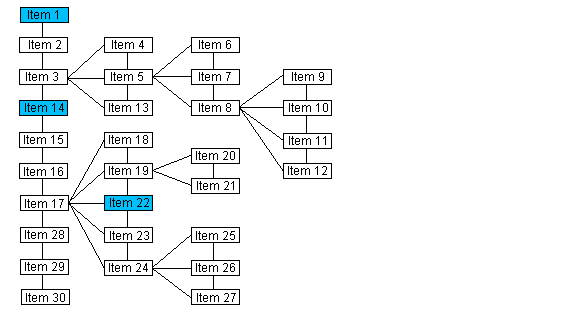FindLastKey(DicomElement,string,bool) Method
Returns the last item in the Dicom Dir Data Set with the specified key element type.
public DicomElement FindLastKey(DicomElement element,string key,bool tree)
Public Overloads Function FindLastKey( _ByVal element As DicomElement, _ByVal key As String, _ByVal tree As Boolean _) As DicomElement
public:DicomElement^ FindLastKey(DicomElement^ element,String^ key,bool tree)
Parameters
element
An item in the Data Set.
key
The type of key element to find.
tree
true to evaluate the Data Set as a tree; false to evaluate the Data Set as a list.
Return Value
The last item in the Data Set with the specified key element type, or a null reference (Nothing in VB) if an item with the specified key element type was not found.
For the sake of the following illustrations, the order of siblings is top to bottom. Therefore last is the item closest to the bottom. If the Data Set is evaluated as a tree structure, this method returns the last item on the same level as element with the same parent as element, that has has key element type key.
Please note that the numbering of the items of interest in this first illustration is arbitrary and does not imply order.

| If the passed object points to: | The method returns an object pointing to: |
|---|---|
| Item 1 | The last sibling (same level, same parent) of Item 1 that has has key element type key, if such an item exists. If such an item does not exist, the method returns null. Searching begins at the bottom. |
| Item 2 | The last sibling (same level, same parent) of Item 2 that has has key element type key, if such an item exists. If such an item does not exist, the method returns null. Searching begins at the bottom. |
| Item 3 | The last sibling (same level, same parent) of Item 3 that has has key element type key, if such an item exists. If such an item does not exist, the method returns null. Searching begins at the bottom. |
If the Data Set is evaluated as a list, this method returns the last item in the entire list that has has key element type key. Searching begins at the bottom of the list.
Please note that the numbering of the items in the following illustration does indicate the order of the items when the Data Set is evaluated as a list.

| If the passed object points to: | The method returns an object pointing to: |
|---|---|
| Item 1 | The last item in the list that has has key element type key, if such an item exists. If an item with key element type key is not found, null is returned. Searching begins at the bottom. |
| Item 14 | The last item in the list that has has key element type key, if such an item exists. If an item with key element type key is not found, null is returned. Searching begins at the bottom. |
| Item 22 | The last item in the list that has has key element type key, if such an item exists. If an item with key element type key is not found, null is returned. Searching begins at the bottom. |
The following methods will also help you find elements in the Data Set with a specific key element type:
Reference
FindLastKey(DicomElement,DicomDirKeyType,Boolean) Method
© 1991-2020 LEAD Technologies, Inc. All Rights Reserved.
